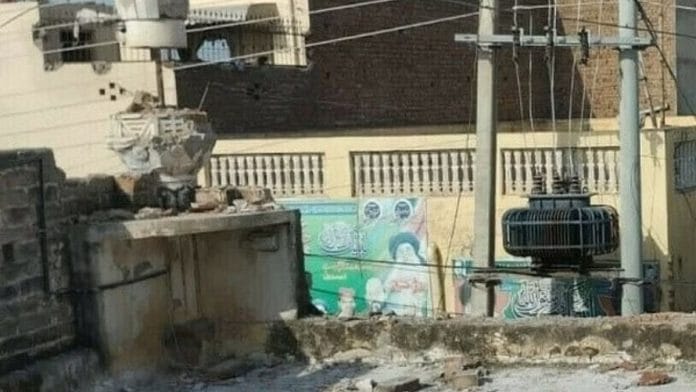New Delhi: Four days after two Ahmadi men were shot dead in Pakistan’s Mandi Bahauddin, yet another incident of alleged atrocity against the community has come to light. This time from Punjab. Police in the Chakwal district detained three Ahmadi leaders for a month, ahead of Eid-ul-Adha, so that they don’t indulge in “unlawful activities”.
Pakistan has the world’s largest population of Ahmadis. It’s the only community that is barred from voting rights and is not recognised as Muslim in the country.
The detainees include the Chakwal district president of the community, Malik Naveed Ahmad, along with ex-president Malik Riaz Ahmad and general secretary Malik Tahir Ahmad, The Friday Times reported.
According to local reports, the Chakwal Deputy Commissioner Quratul Ain Malik invoked Section 3(1) of the Punjab Maintenance of Public Order Ordinance 1961, alleging potential disruptions to law and order by the detained individuals.
However, community members claimed that the detention unfolded following a meeting between the Ahmadiyya community members and local authorities regarding Eid-ul-Adha preparations, specifically concerning the community’s plans for animal sacrifice. They were also asked to submit a surety bond stating that no Qurbani (sacrifice) would take place.
Despite immense pressure from officials to abandon their plans, the Ahmadiyya delegation refused to relent, asserting their legal right to perform the religious rite.
On Wednesday, police demolished a 54-year-old place of worship of the Ahmadis allegedly under pressure from a Right-wing group, despite landmark ruling from the Lahore High Court classifying Ahmadi monuments built before 1984 as legal.
Ahmadiyyas are not recognised as Muslims in Pakistan and the word mosque or masjid is not used for their places of worship either.
This is not the first of such incidents in Chakwal. In 2016, a mob of at least a thousand people attacked an Ahmadiyya place of worship in the province.
Also read: Pakistan just can’t let the Ahmadiyyas live. It’s destroying their places of worship now
The persecuted community
In 1974, the Ahmadis were legally classified as “non-Muslims” under Pakistan’s constitution.
Since then, they’ve faced numerous attacks and discrimination. In 1984, the Muhammad Zia-ul-Haq government restricted their religious practices. The 1985 elections introduced separate voter lists based on religion, leading the Ahmadis to boycott voting until 2002. Under General Pervez Musharraf’s rule, the community was put in a supplementary voting list and were referred to as ‘Qadianis’, which the community considered derogatory.
“The existence of Ahmadis in Pakistan has been tense, especially since 1974 when Zia declared them as non-Muslims. What not many know is that Zia’s maternal uncle was an Ahmadi himself. What has increased the problem is the emergence of TLP that weaponises it and draws its power from the violence on Ahmadis or Christians,” said Ayesha Siddiqa, Pakistani political scientist.
Siddiqa added that Ahmadis are part of Pakistan’s military and bureaucracy but they keep their identities hidden. The country’s former Chief of Army Staff General Qamar Javed Bajwa, an Ahmadi, had to officially attest a document stating that he had converted to Islam before being promoted from colonel to brigadier.
Even in 1960, former President General Ayub Khan had to withdraw Ahmadi troops being sent to Saudi because the country refused to accept them.
“The life of an Ahmadi in Pakistan is not easy. They live in hiding, can’t pray in public spaces and their faith has increasingly become private, away from the public eye,” Siddiqa added.
Despite their significant population of over 5,00,000 in Pakistan, Ahmadis are effectively barred from voting in local, provincial, and national elections. To become eligible voters, they must either abandon their faith or consent to being listed separately as “non-Muslims” on electoral rolls. However, identifying as Muslims is fundamental to Ahmadiyya beliefs.
The community had also boycotted the 2024 general elections in the country to protest against the repeated persecution. It was their response to a series of incidents of Ahmadi grave desecration across various towns in Punjab province.
In 2020, MP and Chair of the UK All Party Parliamentary Group (APPG) for the Ahmadiyya Muslim Community, Siobhain McDonagh wrote on the lack of voting rights for Ahmaddiyas in Pakistan. She added that the APPG, in a first of its kind report highlighted ‘undeniable evidence of state-sponsored persecution against Ahmadi Muslims, with anti-Ahmadi laws enshrined in the Pakistani constitution and its Penal Code.’
In 2022, at least 14 places of worship and 197 graves belonging to Ahmadis were desecrated and three community members were fatally shot, purportedly because of their religious beliefs.
In 2023, 74 Ahmadi graves were reportedly vandalised in Punjab under pressure from the Tehreek-e-Labbaik Pakistan (TLP), which also threatened local authorities of consequences if the sites were not demolished.






